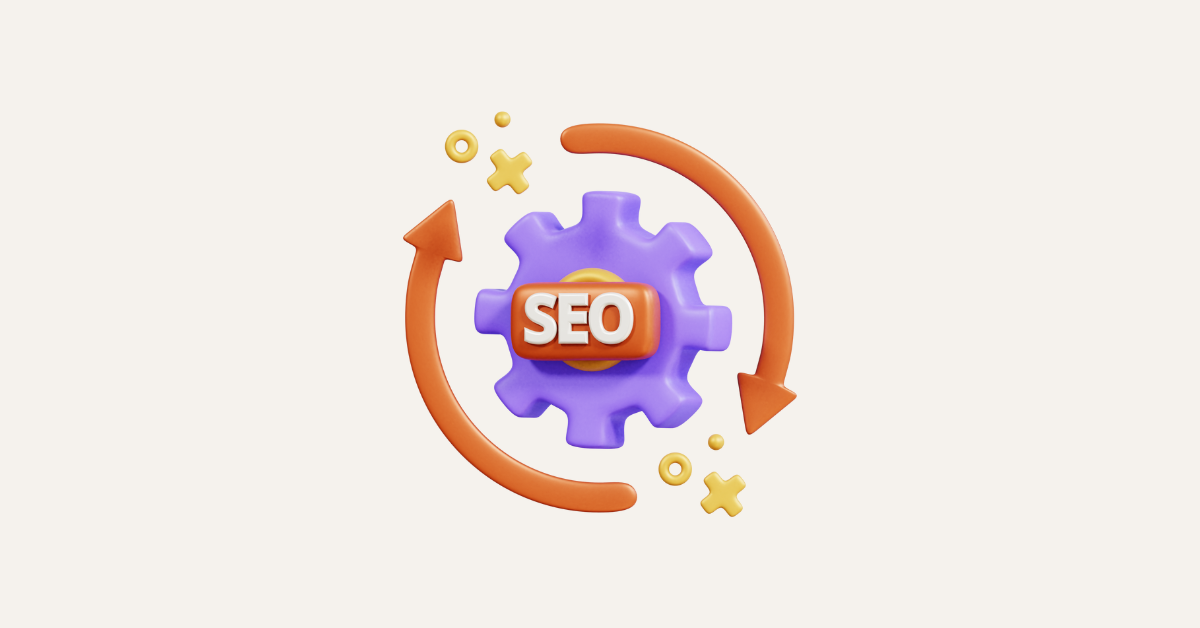Search Engine Optimization: Roadmap to Success
Search Engine Optimization (SEO) is crucial for web admins looking to enhance their website visibility and attract organic traffic.
It plays a vital role in digital marketing and content marketing strategies. One essential aspect of SEO is optimizing meta description tags.
By optimizing websites, web admins can increase their rankings on search engine result pages and improve their organic results.
Good SEO work is crucial for achieving higher rankings. SEO focuses on on-page and off-page strategies to enhance website performance and authority in organic rankings and search results.
Web admins employ these strategies to improve their website’s visibility and increase their chances of appearing in the top organic results.
In contrast, Search Engine Marketing (SEM) includes paid advertising alongside organic optimization efforts such as SEO work, page SEO, technical SEO, and web admins.
While SEM provides immediate results, SEO is a long-term strategy that aims for sustained growth in organic rankings.
Web admins must utilize tools like Google Search Console and stay updated with the latest insights from Search Engine Land.
On-page SEO involves optimizing content and HTML elements within a webpage to improve organic search results.
Meanwhile, off-page SEO focuses on building backlinks and improving website authority for better organic results. According to Search Engine Land, web admins should pay attention to both on-page and off-page SEO strategies.
Technical SEO ensures proper website structure and indexing.
Understanding the different types of SEO allows web admins and businesses to implement effective search marketing strategies that improve their online presence and attract more visitors organically.
This is important for sites to succeed in the competitive digital landscape.
How Search Engines Function
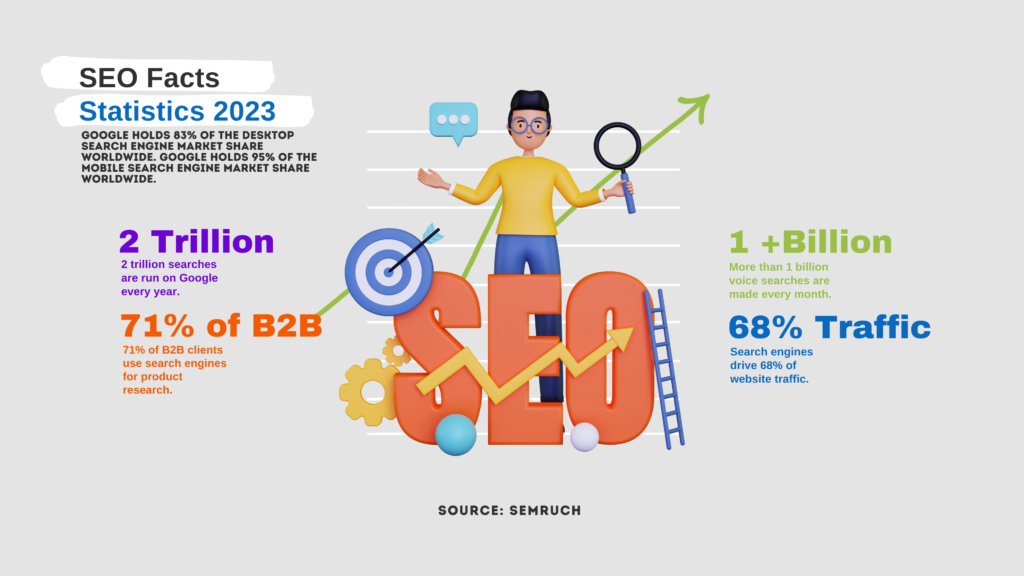
Indexing and Ranking Basics
Search engines like Google have a two-step process. First, admins crawl the web, scouring countless websites to gather information for Google search results.
They analyze the data and use it to determine the ranking of websites on the search results page.
This process is crucial for search engine land and ensuring relevant and accurate search results for users.
This process is similar to how a spider crawls along its web, exploring every nook and cranny of pages, descriptions, URLs, and sites.
Once search engines like Google crawl a webpage, the search engines index it in their databases along with other pages, sites, and URLs. Think of it as organizing all the information they’ve collected from websites and links to retrieve it later easily.
The page’s title serves as a way to identify and access the specific content quickly.
This index contains vast amounts of data about each webpage, allowing Google and other search engines to provide relevant results when someone performs a search. It includes information about the pages, links, and URLs.
But how do search engines like Google determine which websites rank higher in the search results?
One of the critical factors is on-page SEO, which involves optimizing individual pages with relevant keywords and links. Well, that’s where ranking factors come into play.
Search engines like Google use various criteria to evaluate and rank webpages based on their relevance, authority, and the number of links pointing to the site’s URL.
These factors, as outlined by Search Engine Land, include things like keyword usage, quality of content, backlinks from other reputable sites, user experience signals (such as page load speed), and more.
It is essential to monitor these factors through tools like Google Search Console to optimize the performance of your pages in search engine rankings.
To improve your website’s chances of ranking higher in Google search engine results pages (SERPs), you need to optimize your content by including relevant keywords in the text.
For example, incorporating links and using the correct anchor text can significantly enhance your website’s visibility.
By strategically incorporating relevant keywords into your website’s content, meta tags, and page SEO, you increase the likelihood of being indexed by Google search for those specific terms.
As discussed in Search Engine Land, this is an essential aspect of search engine optimization (SEO).
Additionally, having quality links to your website can improve your chances of ranking higher in search results.
Creating high-quality content that provides value to users can help establish your site as an authoritative source within your niche.
This will improve your site’s visibility in Google search and attract more visitors to your web pages through relevant links.
Google’s Algorithm Explained
Google is undoubtedly one of the major players in web search engines. It indexes millions of site pages and provides users relevant links to their search queries.
Google utilizes complex algorithms to analyze web pages and determine their rankings in search results.
These algorithms consider links, text, and other page elements. These algorithms consider numerous factors, such as keywords used throughout the content and pages, links pointing to the site from other reputable sources, user signals (like click-through rates), and many others.
This helps improve visibility on Google search and other web platforms.
Updates like Panda or Penguin have had a significant impact on how Google’s algorithm ranks websites Google’s algorithm.
These updates consider factors such as the quality of pages, the relevance of links, and the optimization of text.
Website owners must understand and adapt to these updates to improve their rankings and visibility on search engine result pages. For example, Google’s Panda algorithm penalized low-quality pages and rewarded websites with high-quality, original text.
Conversely, Penguin targeted manipulative link-building practices on web pages and aimed to promote natural and organic link profiles on Google search.
Understanding how search engines like Google function is crucial for anyone looking to optimize their website pages for better visibility.
By understanding how search engines use text, you can effectively use keywords to improve your website’s rankings.
By aligning your content with the ranking factors that Google and other search engines consider, you increase your chances of appearing higher in search results.
This means optimizing your web pages and site to meet the criteria set by these search engines.
Remember, when creating content for your website, it’s essential to consider how it will appear in a Google search.
It’s not just about stuffing keywords into your pages; it’s about providing valuable information that meets the needs of users while adhering to SEO best practices on the web.
On-Page Optimization Techniques
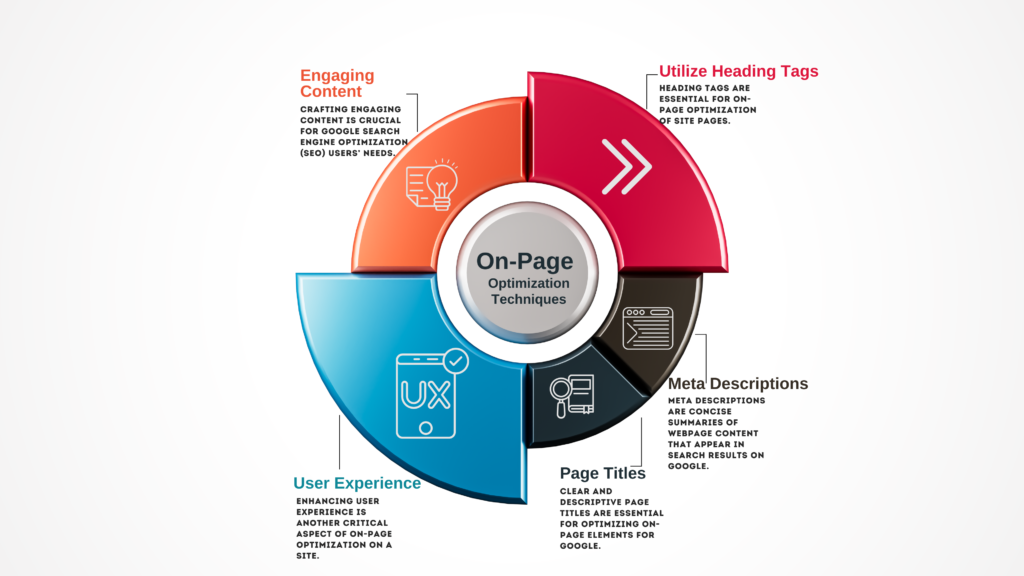
Crafting Engaging Content
Crafting engaging content is crucial for Google search engine optimization (SEO) users’ needs.
Google’s search algorithm evaluates web pages based on the quality and relevance of the content, including the use of keywords within the text.
Creating compelling and informative web pages incorporating relevant keywords can improve your website’s visibility and rankings on Google’s search results pages.
Creating high-quality, informative, and relevant content for your Google site can attract users and search engines to your web pages.
One effective technique to structure the content on your web pages is by utilizing heading tags (H1-H6). This can help improve your site’s visibility in Google search results.
These tags help organize your web content hierarchy, making it easier for readers to navigate through the pages on your site.
This improved organization can also enhance your visibility in Google search results. Incorporating relevant keywords in your headings also signals to Google and other search engines that your web pages and site content are relevant to specific queries.
Remember to format the headings on your site’s pages properly for an enhanced user experience and better visibility in Google search.
Utilizing Heading Tags
Heading tags are essential for on-page optimization of site pages. They significantly impact the visibility of your site on Google search.
Could you use heading tags effectively to improve your site’s ranking? Pages structure your site’s content hierarchy, making it more readable and scannable for users.
This, in turn, improves your site’s visibility in Google search. By using relevant keywords within the heading tags on your site, you can signal to Google the relevance of your content and improve your pages’ visibility in search engine results.
Properly formatted heading tags enhance readability and improve the overall user experience on Google search pages. They make your site more organized and easier to navigate.
Optimizing Meta Descriptions
Meta descriptions are concise summaries of webpage content that appear in search results on Google.
These descriptions provide a brief overview of the pages on your site, making it easier for users to understand what they can expect when they click through to your site.
Using relevant and compelling meta descriptions can improve the click-through rate and drive more traffic to your site.
Optimizing meta descriptions is essential as they can entice users to click on your page in search engine results.
When users see your website listed on Google, the meta description briefly previews what they can expect to find on your site.
By crafting compelling meta descriptions that include relevant keywords, you can increase the chances of attracting more visitors to your site.
Craft persuasive meta descriptions that accurately describe the content while incorporating relevant keywords for Google.
Ensure these meta descriptions effectively entice users to click through to your page or site. Use the appropriate keywords to enhance the overall description and increase its visibility on search engine results pages.
A compelling meta description on your website’s page can significantly improve click-through rates (CTR) and drive more organic traffic from Google. You can use it to increase visibility and attract more visitors to your site.
Effective Page Titles
Clear and descriptive page titles are essential for optimizing on-page elements for Google.
Using clear and descriptive page titles is vital to improve the overall user experience when designing a site.
A well-crafted page title helps users understand the webpage at a glance, making it easier for Google to index and rank your site.
Including target keywords in the page title improves relevancy and increases visibility in Google search engine result pages (SERPs). This is because Google uses these keywords to determine a site’s relevance to a user’s search query.
You can optimize your site for better search engine rankings by incorporating relevant keywords into the page title.
It’s crucial to balance conciseness and descriptiveness when creating page titles for your Google site, as this will attract clicks from potential visitors who use Google to search for relevant content.
Enhancing User Experience
Enhancing user experience is another critical aspect of on-page optimization on a site.
This optimization helps improve the site’s visibility on Google. Improving site hierarchy and navigation creates a seamless browsing experience for your users.
This will help your page rank higher on Google. A well-defined site hierarchy organizes content logically, making it easier for users and search engines to navigate your website.
This helps improve your website’s visibility on Google and enhances the user experience on each page.
Optimizing internal linking helps distribute link equity throughout the site, enhancing crawlability and indexation on Google’s page. The use of internal linking is crucial for optimizing a website’s performance.
Site Hierarchy and Navigation
A clear site hierarchy enhances user experience by providing a logical structure to your website’s content.
This logical structure helps search engines like Google understand the organization of your page.
Easy-to-navigate websites make it simpler for users to find what they’re looking for and improve crawlability and indexation for search engines like Google.
These websites ensure that important information is easily accessible on every page.
Off-Site Optimization Strategies
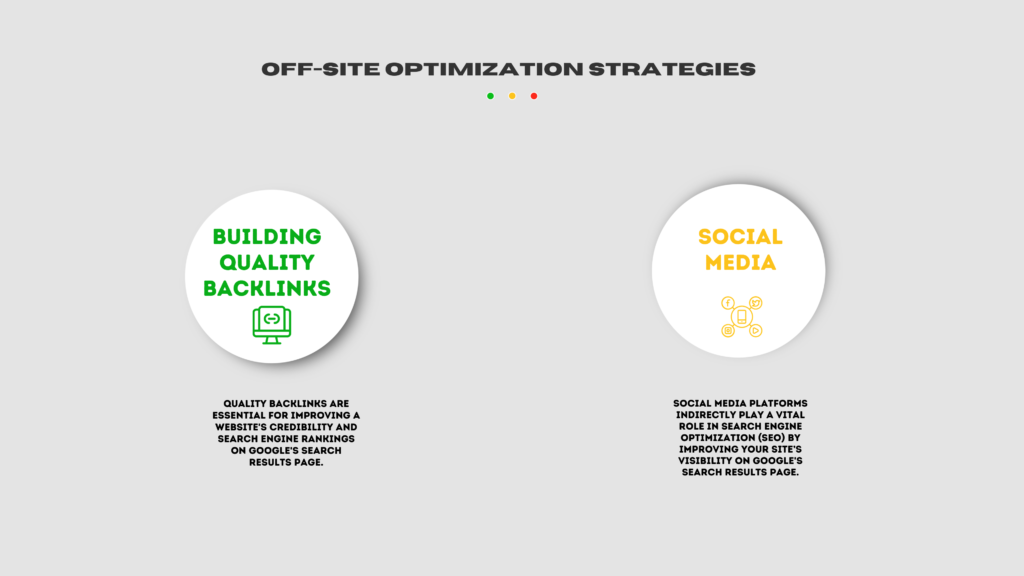
Building Quality Backlinks
Quality backlinks are essential for improving a website’s credibility and search engine rankings on Google’s search results page.
I think using these backlinks effectively is necessary to enhance your website’s visibility and authority.
These authoritative backlinks come from trusted websites favored by search engines like Google. They help improve the ranking of your page.
To build quality backlinks, focus on acquiring them naturally through high-quality content and outreach efforts.
This will improve your site’s visibility on Google and increase the authority of your pages.
Creating valuable and informative content on your website increases the chances of earning backlinks from reputable sources. This can improve your site’s visibility on Google’s search page.
Avoid spammy or low-quality backlinks at all costs. These links can harm your website’s reputation on Google’s search engine page and even lead to penalties from search engines.
It’s important to prioritize quality over quantity.
Social Media as an SEO Tool
Social media platforms indirectly play a vital role in search engine optimization (SEO) by improving your site’s visibility on Google’s search results page.
While social media signals may not directly impact Google search engine rankings, they can indirectly influence page and site rankings.
Sharing your website’s content on social media platforms increases its visibility and reach, potentially attracting more organic traffic to your page.
Social media profiles often appear in search engine results pages (SERPs).
Having an active presence on social media enhances your brand’s online presence and makes it easier for users to find you when they conduct relevant searches on your site or page.
For local businesses, leveraging social media is incredibly crucial. Local customers often turn to platforms like Facebook or Instagram to discover nearby businesses and read reviews before purchasing on the site or page.
By optimizing your social media profiles with relevant keywords and location information, you increase the likelihood of appearing in local searches on your site or page.
Technical SEO Essentials
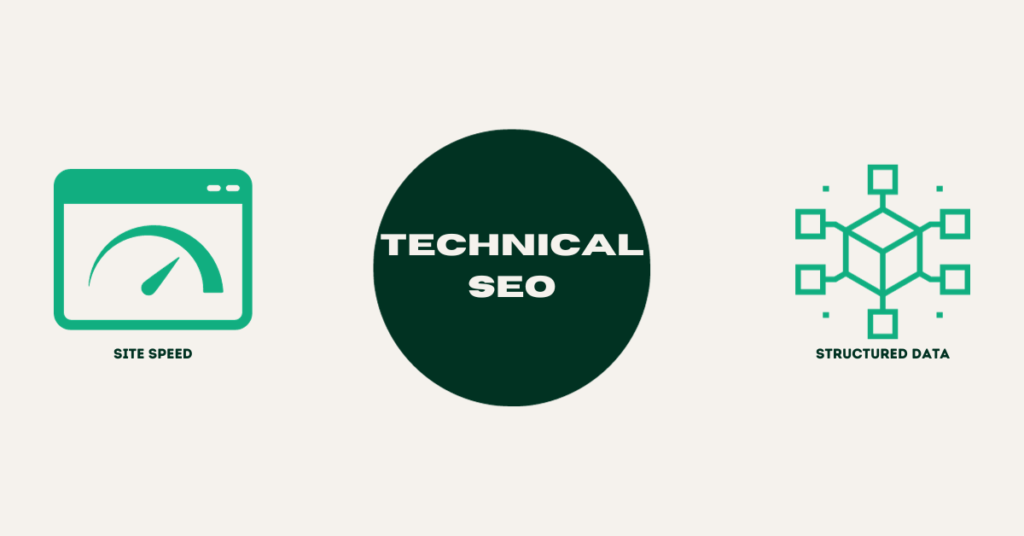
Site Speed and Mobile-Friendliness
Fast-loading websites are essential for a good user experience and higher search engine rankings. A fast-loading page provides a positive user experience and improves your search engine rankings.
When a website page takes forever, it frustrates users who might bounce off to another site. Nobody likes waiting. So, make sure your website loads like a cheetah on Red Bull on every page!
But it’s not just about speed. With the increasing use of mobile devices for browsing, having a mobile-friendly website is crucial.
Imagine viewing a desktop-only website on your phone – it’s like trying to fit an elephant into a Mini Cooper! Not fun at all.
You can optimize images by compressing them without losing quality to improve site speed.
It’s like squeezing that last drop of toothpaste from the tube on your site! Minifying code is also essential for optimizing your site – remove unnecessary spaces and characters to make your code lean and mean.
And remember caching techniques – they help store some aspects of your website so they don’t have to be loaded repeatedly.
Structured Data Markup
Structured data markup on a site may sound fancy, but it’s pretty cool. The site provides additional context about the content on your webpage to search engines.
Think of it as giving search engines superpowers – they can better understand your site’s content and display relevant information in search results.
One benefit of structured data markup is the appearance of rich snippets on the site in search results.
These eye-catching snippets provide more details about your webpage and can increase click-through rates on your site. Who wouldn’t want their website to stand out in the crowd?
Schema.org is the go-to vocabulary used by many websites. It’s like speaking the same language as search engines – they understand your site better!
Implementing structured data markup on your site using Schema.org makes it easier for search engines to interpret your site’s content accurately.
So there you have it – two essential technical SEO elements: site speed, mobile-friendliness, and structured data markup.
Remember, a fast-loading website is like a Usain Bolt of the internet, and being mobile-friendly is like speaking the language of smartphones.
And when you implement structured data markup with Schema.org on your site, search engines will be your best friends.
The Importance of SEO for Websites
Search Engine Optimization (SEO) plays a crucial role in the success of websites. Explore why it is essential and how it can benefit website owners and web admins.
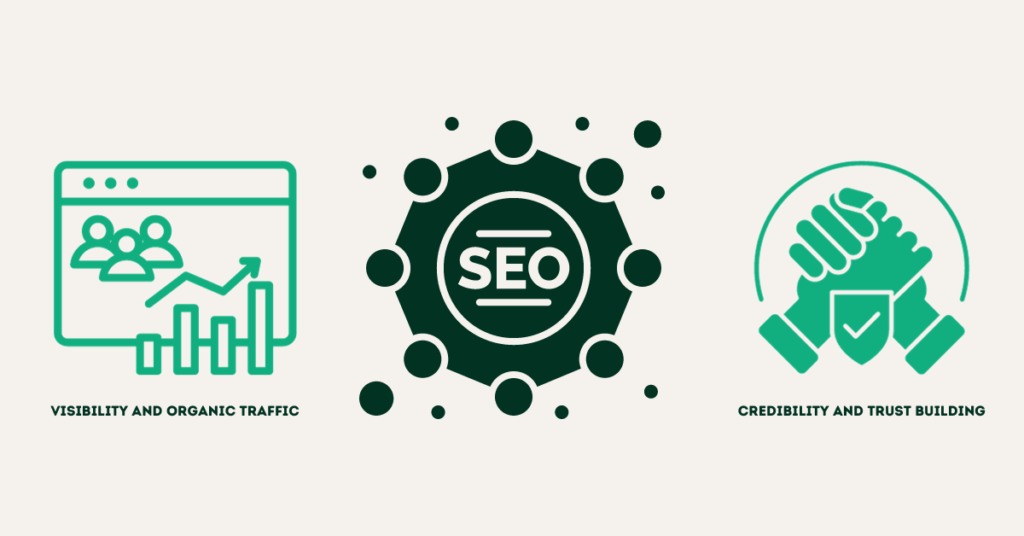
Visibility and Organic Traffic
One of the primary reasons SEO is essential is that it helps increase visibility in search results, leading to higher organic traffic on your site.
When your website ranks on the first page of search results, more people are likely to click on it.
Think about it – when was the last time you went beyond the first page of a search engine site when looking for something online? Exactly!
SEO strategies like keyword optimization are critical to improving your site’s visibility. By identifying relevant keywords that users search for, you can optimize your website’s content accordingly.
This ensures that search engines recognize your site as a valuable resource, increasing its chances of appearing higher in search results.
Credibility and Trust Building
Another vital aspect of SEO is establishing credibility and building trust with users on your site.
When visitors come across your website, they want to know if they can trust the information provided or should look elsewhere.
By offering quality content on your site that meets the needs and expectations of your audience, you can establish yourself as a credible source.
Good user experience also contributes to building trust. A well-designed website that is easy to navigate enhances user satisfaction and encourages them to stay longer.
Positive reviews and testimonials from satisfied customers further boost credibility by showing that others have had a positive experience with your site.
To build trust, ensure that you provide accurate information on your website. Cite reliable sources on your site whenever necessary to back up your claims.
Prioritize security using SSL certificates to enable secure connections between users’ browsers and your site.
By focusing on these aspects of SEO – visibility, credibility, and trust-building – website owners can create an engaging online presence that attracts more visitors.
Learning and Developing SEO Skills
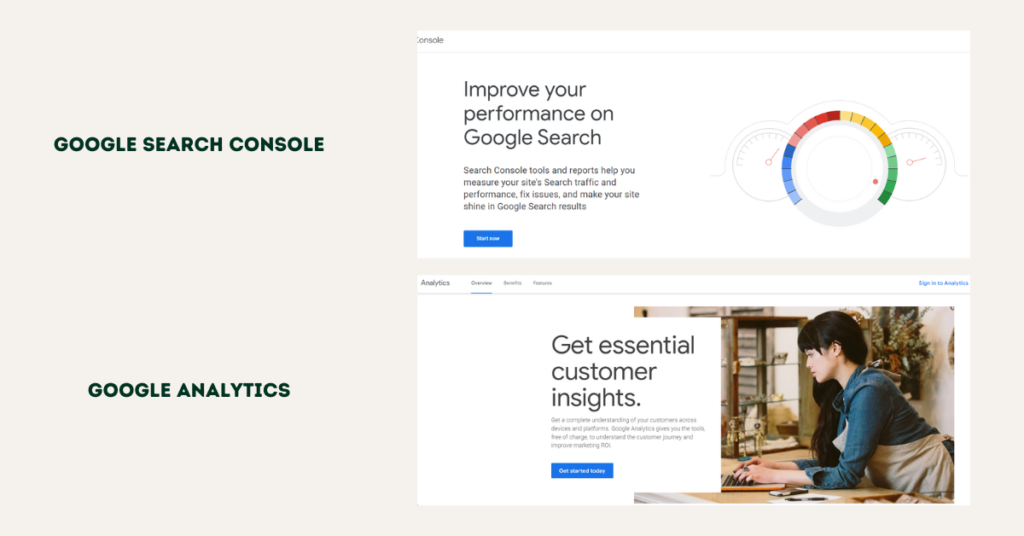
Google’s SEO Resources
Google provides valuable resources to help you learn and develop your search engine optimization (SEO) skills.
These resources include tools like Search Console, Analytics, and Page Speed Insights. These tools can be accessed on the site.
Search Console allows you to monitor the performance of your website in Google search results. It helps identify any issues affecting your site’s visibility and provides recommendations for improvement.
With Analytics, you can track essential metrics on your site, such as organic traffic, rankings, bounce rate, and conversion rate.
This data gives insights into how users interact with your website and help you make informed decisions to optimize it.
Page Speed Insights is another helpful tool offered by Google. The site analyses the speed of your web pages and provides suggestions for improving their loading time on your site.
A faster website enhances user experience and contributes positively to SEO rankings.
In addition to these tools, Google’s Webmaster Guidelines offer the best website optimization practices.
These guidelines provide recommendations on various aspects of SEO, including content quality, technical considerations, mobile optimization, and more.
The guidelines help improve the visibility and ranking of a site by focusing on essential factors such as the quality of the content, technical optimization, and mobile-friendly design.
Following these guidelines can lead to better search engine rankings and increased organic traffic to your site.
By following these guidelines, you can ensure that your website meets Google’s standards for optimal performance in search results.
Analyzing Search Performance
Analyzing your website’s search performance is crucial for understanding its effectiveness in attracting organic traffic.
Tracking key metrics on a site, such as organic traffic, is essential as it indicates the number of visitors from search engines like Google.
Another vital metric is rankings, where your website appears in search engine results pages (SERPs).
Monitoring changes in rankings on your site over time can help identify areas where improvements are needed.
To gain deeper insights into user behavior on your website, analyze search queries made by visitors. Understanding user intent behind queries on your site allows you to optimize your content accordingly.
For example, if users frequently search for “best hiking boots,” creating a comprehensive guide or review article on hiking boots can attract more relevant traffic to your site.
You can use analytics tools to gain valuable insights into user behavior on your website. These site tools provide data on-site metrics such as session duration, bounce rate, and conversion rate.
By analyzing data from your site, you can identify areas where users may need to be dropping off or not converting and make necessary improvements to enhance the overall user experience on your site.
Implementing an Effective SEO Strategy
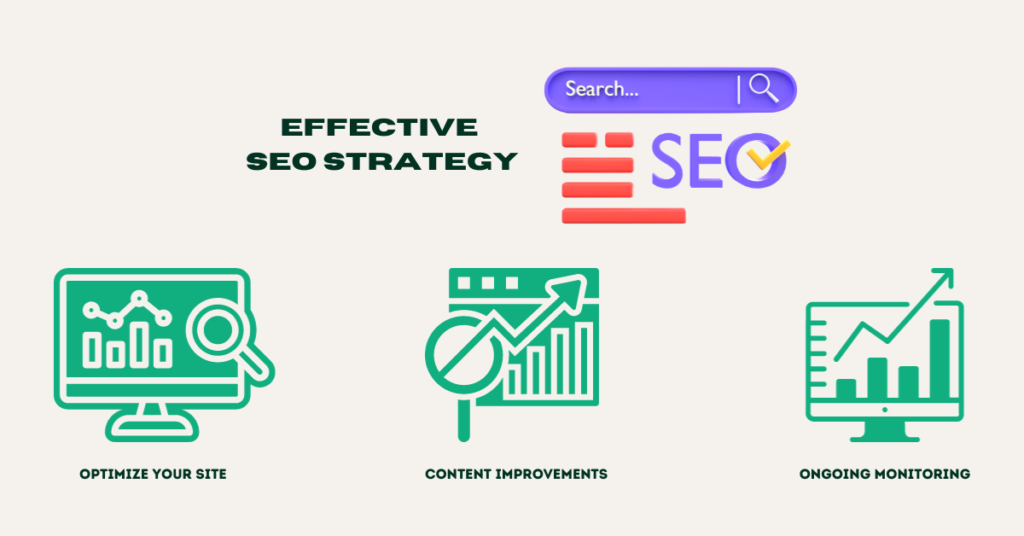
Initial Steps to Optimize Your Site
To kickstart your search engine optimization (SEO) journey, you need to take a few essential steps on your site.
First and foremost, it’s crucial to ensure that your website is correctly indexed by search engines like Google.
One way to achieve this is by submitting XML sitemaps to Google Search Console. This helps search engines understand the structure of your site and improves indexation.
I think it’s essential to address any crawl errors on your site that might prevent search engines from accessing your web pages.
By fixing these site errors, you ensure that search engines can discover and rank your content. Another step towards optimizing your site is optimizing the robots.txt file.
This file allows you to control which pages on your site should be crawled and indexed, ensuring that only relevant content appears in search results.
Content Discoverability Improvements
Producing high-quality and relevant content is critical. It’s important to create valuable content on your site that aligns with user search intent, providing information or solving their problems.
To do this effectively, conducting keyword research on your site can help you identify popular topics and incorporate them into your content strategy.
Promoting your content through various channels is crucial for enhancing its discoverability on your site.
Social media platforms, email marketing campaigns, and influencer outreach can help drive traffic to your website while increasing its visibility across different online communities.
Ongoing Monitoring and Maintenance
Implementing an effective SEO strategy requires continuous monitoring and maintenance of your website.
Regularly analyzing website performance using analytics tools allows you to track key metrics such as organic traffic, bounce rate, and conversion rates. This data provides insights into how well your SEO efforts are performing on your site.
It’s also important to regularly check for broken links or outdated content on your site, as they can negatively impact SEO efforts.
Fixing these issues ensures a smooth user experience and helps search engines crawl and index your website more effectively.
Furthermore, staying updated with algorithm changes is crucial in the ever-evolving world of SEO. It is essential to regularly monitor and adapt to changes on your site to ensure optimal performance.
Search engines like Google frequently update their algorithms, impacting how websites are ranked in search results.
By keeping up with these changes, you can adapt your SEO strategies to maintain or improve your website’s visibility.
Measuring SEO Success
Key Performance Metrics
To determine the success of your SEO efforts, it is crucial to measure key performance metrics on your site.
These metrics provide valuable insights into the effectiveness of your SEO strategy on your site. Here are three critical metrics to consider:
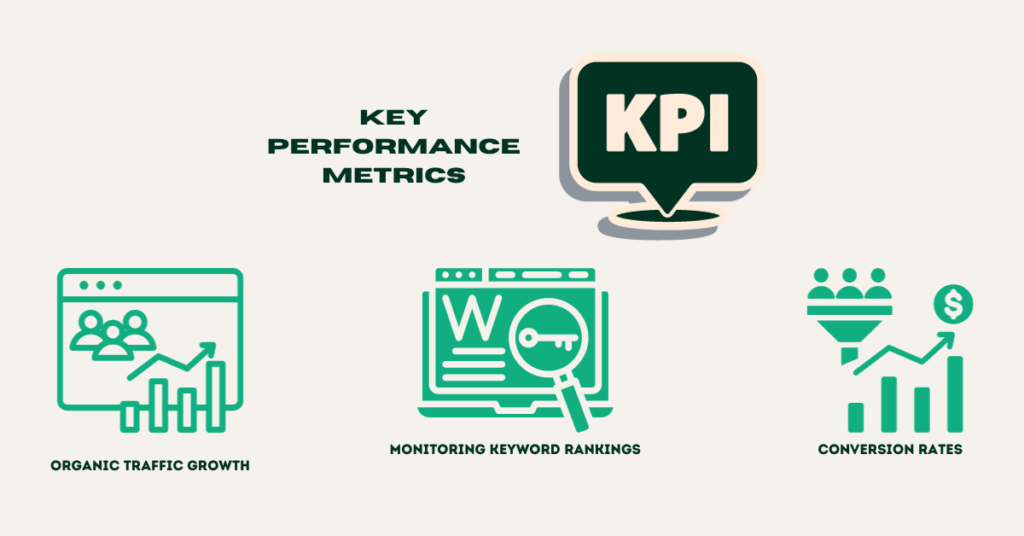
- Organic Traffic Growth: One way to gauge SEO success is by measuring organic traffic growth to a site over time. Organic traffic refers to visitors who find your website through unpaid search results. By tracking this metric, you can assess whether your SEO efforts drive more people to your site.
- Monitoring keyword rankings is another essential metric for evaluating SEO success on a site. Keep an eye on how well your targeted keywords perform on your site in search engine results pages (SERPs). Improvements in site keyword rankings indicate increased site visibility and higher chances of attracting organic traffic.
- Conversion Rates: Ultimately, the effectiveness of SEO lies in its ability to drive desired actions on your website, such as making a purchase or filling out a contact form. Analyzing conversion rates on your site allows you to evaluate how well your SEO strategy converts visitors into customers or leads.
Reporting on SEO Outcomes
Once you have measured these key performance metrics on your site, you must report on the outcomes of your SEO efforts effectively.
Here’s how you can showcase and communicate the success of your SEO strategy on your site.
- Comprehensive Reports: Provide detailed reports highlighting improvements in organic traffic, keyword rankings, and other relevant metrics on the site. These site reports should clearly outline the progress made on the site over a specific period and compare it with previous site data.
- Key Achievements: Highlight significant achievements from your SEO efforts, such as increased visibility on SERPs or higher click-through rates (CTR) on your site. These achievements serve as tangible evidence of the positive impact that effective SEO can have on a website’s performance.
- Future Optimizations: Based on data analysis and insights from measuring key performance metrics, could you suggest future optimizations to enhance your SEO strategy? I’d like to point out that identifying areas for improvement and providing actionable recommendations will help maintain the momentum of your SEO success.
Standard SEO Terms and Concepts
Glossary Overview
A glossary is like a dictionary that defines standard terms used in the SEO industry. It’s a handy tool when diving into search engine optimization.
This glossary includes explanations of technical jargon related to indexing, ranking factors, and other essential aspects of SEO.
Understanding these terms will help you navigate the complex concepts mentioned in this article. So, let’s break down some key terms you should know:
- Indexing: The process by which search engines crawl and store web pages in their databases.
- Ranking Factors: The various elements that search engines consider when determining where a website should appear in search results.
- Keywords: Words or phrases people use to search for information on search engines.
- Target Keywords: Specific keywords that website owners optimize their content for to rank higher in search results.
The Need for an SEO Expert
Having an SEO expert by your side can make all the difference. These professionals possess in-depth knowledge and experience in the field of SEO.
They stay updated with algorithm changes and industry best practices so they can effectively optimize websites.
Hiring an SEO expert offers several benefits:
- Time-Saving: Optimizing your website for search engines involves a lot of research, analysis, and implementation. By hiring an expert, you can save valuable time and focus on other aspects of your business while they handle your SEO needs.
- Improved Results: SEO experts deeply understand how search engines work and what it takes to rank higher in organic search results. With their expertise, they can implement strategies that drive more traffic to your website and improve its visibility online.
- Avoid Costly Mistakes: Search engine algorithms constantly evolve, making it challenging for non-experts to keep up with the latest trends and best practices. By hiring an SEO expert, you can avoid costly mistakes that could negatively impact your website’s rankings.
Conclusion
In conclusion, this article has provided a comprehensive overview of search engine optimization (SEO) and its importance for websites.
Readers have gained valuable insights into effectively implementing an SEO strategy by exploring various aspects such as on-page optimization techniques, off-site optimization strategies, technical SEO essentials, and measuring SEO success.
By understanding the fundamentals of SEO content writing and how search engines function, individuals can enhance their website’s visibility and attract more organic traffic.
Furthermore, learning and developing SEO skills is crucial in staying up-to-date with the ever-evolving digital landscape.
An effective SEO strategy combines technical knowledge, content creation, and continuous analysis to achieve long-term success.
To further excel in SEO, it is recommended that readers continue to educate themselves on the latest trends and best practices in the field.
By staying informed and adapting their strategies accordingly, individuals can maximize their website’s potential and reach a wider audience online.
With the power of SEO, businesses and individuals alike can increase their online presence and establish themselves as authorities within their respective industries.
FAQs
What is search engine optimization?
Search engine optimization (SEO) is optimizing a website to improve its visibility and ranking on search engine results pages.
It involves keyword research, on-page optimization, and link-building techniques to attract organic traffic and increase online presence.
Why is SEO important for businesses?
SEO is crucial for businesses as it helps improve their online visibility, drive targeted website traffic, and increase brand awareness.
By optimizing their websites for search engines, businesses can reach potential customers actively searching for products or services related to their industry.
How long does it take to see results from organic search and improve organic rankings through SEO efforts?
It is a common question among web admins. With the help of Google Search Console, you can track your progress and adjust your SEO strategy.
The time it takes to see results from SEO efforts can vary depending on several factors, such as the competitiveness of keywords, the quality of optimization, and the existing authority of the website.
Generally, significant improvements in search rankings can be observed within 4-6 months with consistent and effective SEO strategies.
What are some common SEO mistakes to avoid?
Some common SEO mistakes to avoid include keyword stuffing (overusing keywords unnaturally), neglecting mobile optimization, ignoring meta tags and descriptions, using low-quality or irrelevant backlinks, and not regularly updating content.
These mistakes can negatively impact a website’s search rankings and user experience.
Is it necessary to hire an SEO agency?
While hiring an SEO agency is optional, it can benefit businesses needing more expertise or resources to handle SEO internally.
An experienced agency can provide valuable insights, develop effective strategies tailored to specific business goals, monitor performance metrics, and stay up-to-date with ever-changing search engine algorithms.
